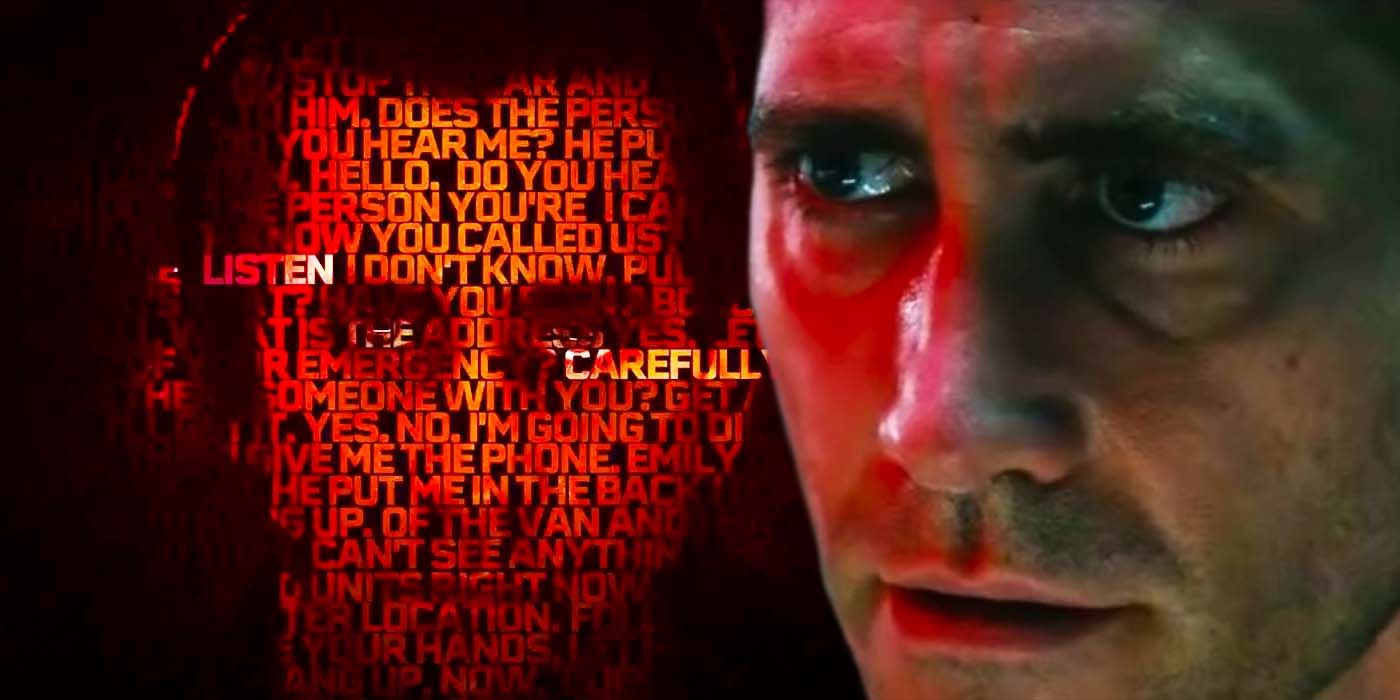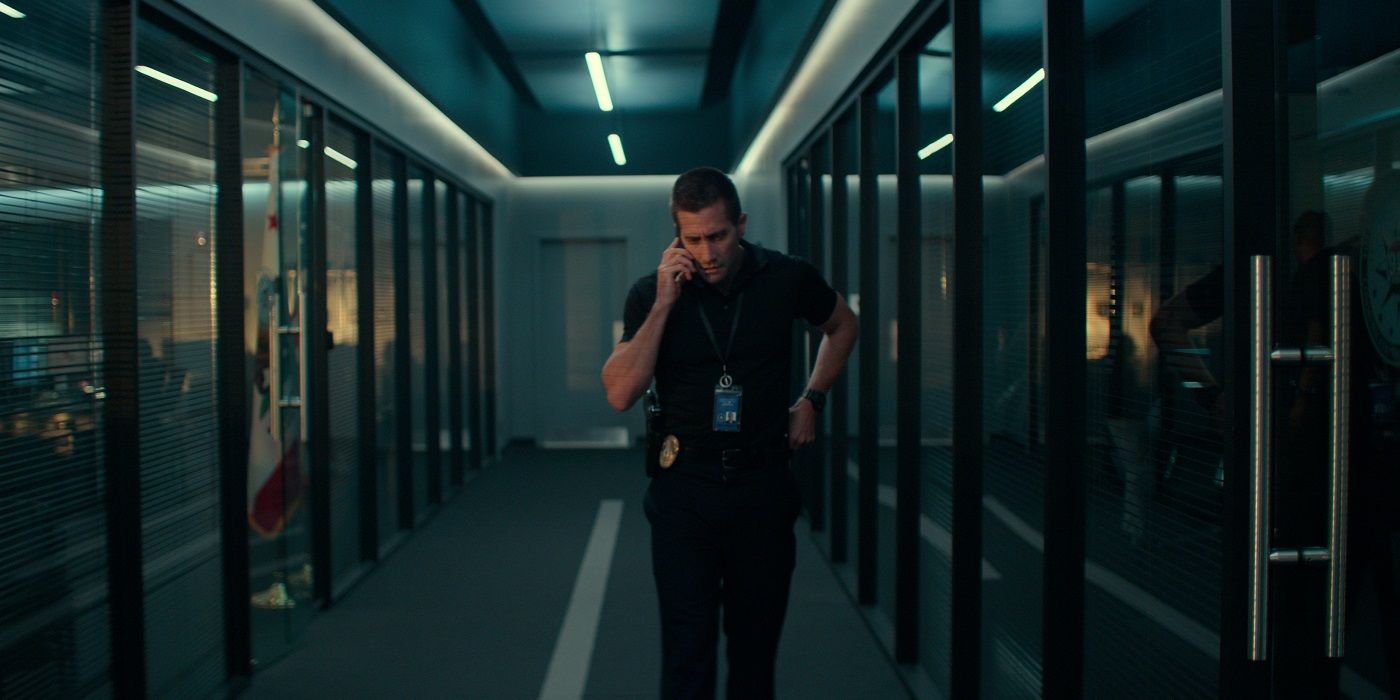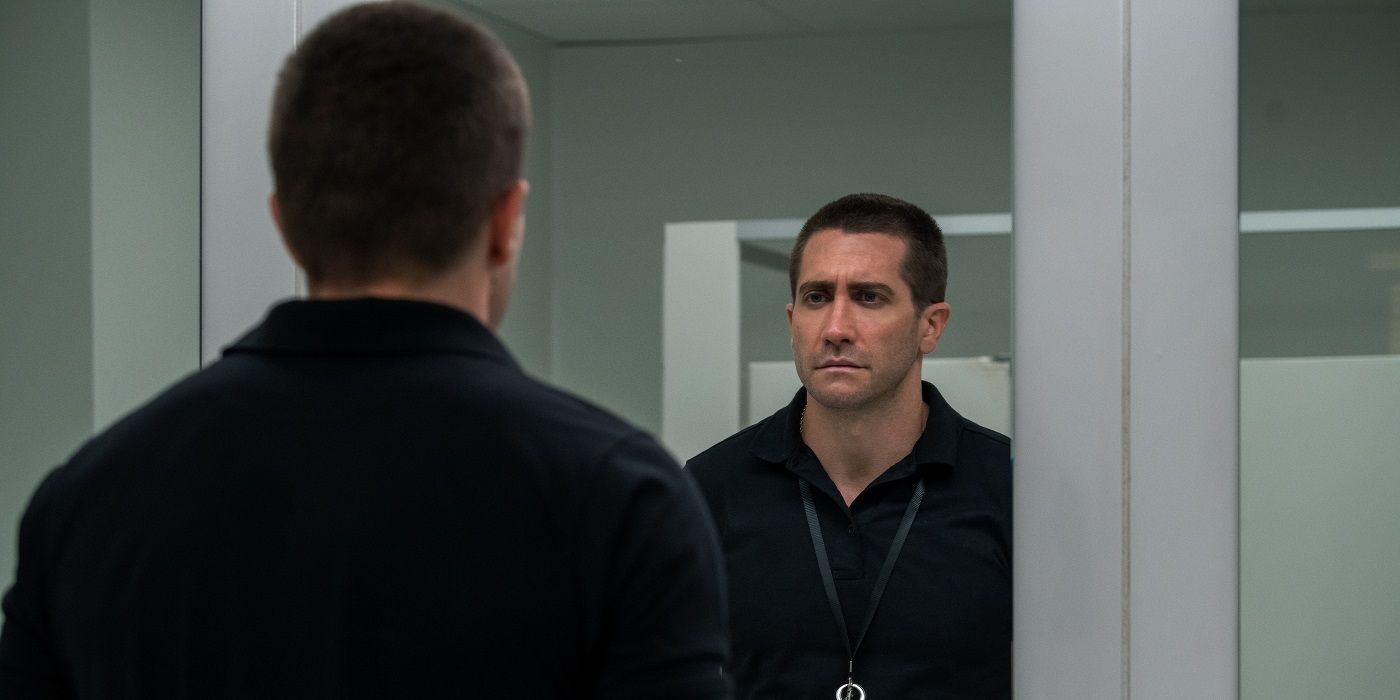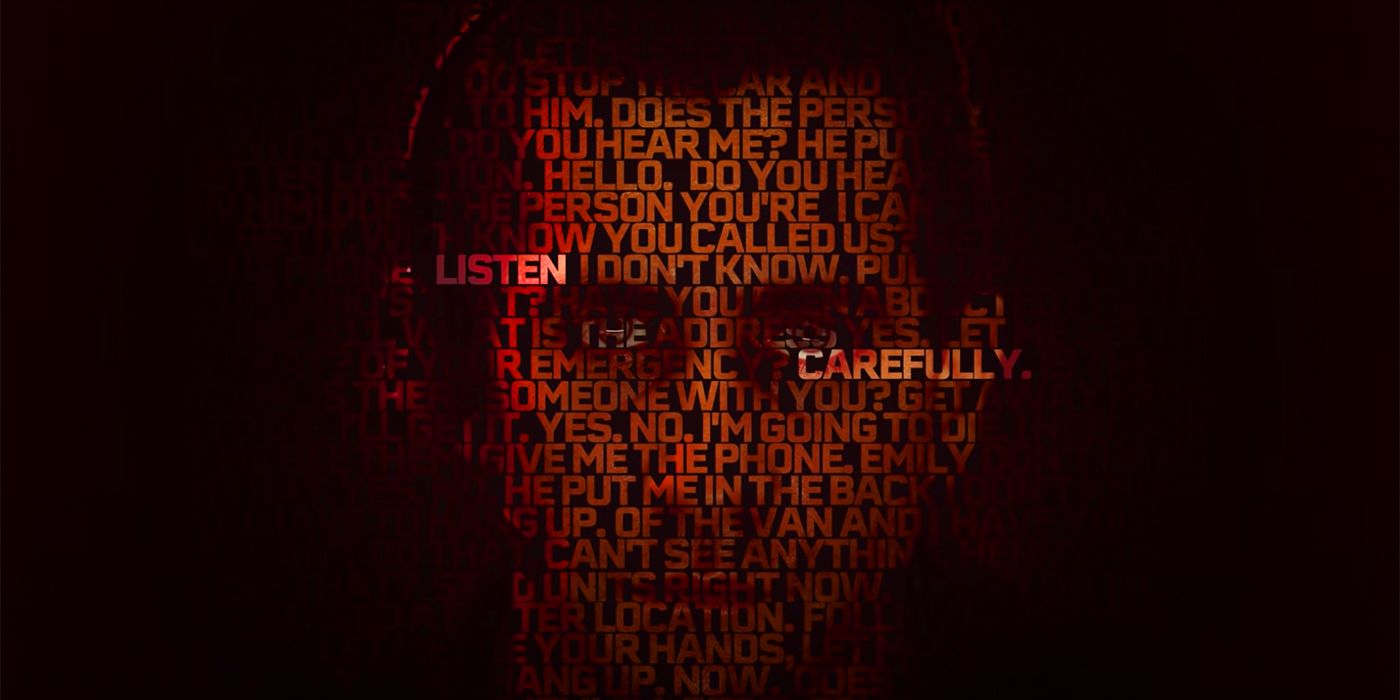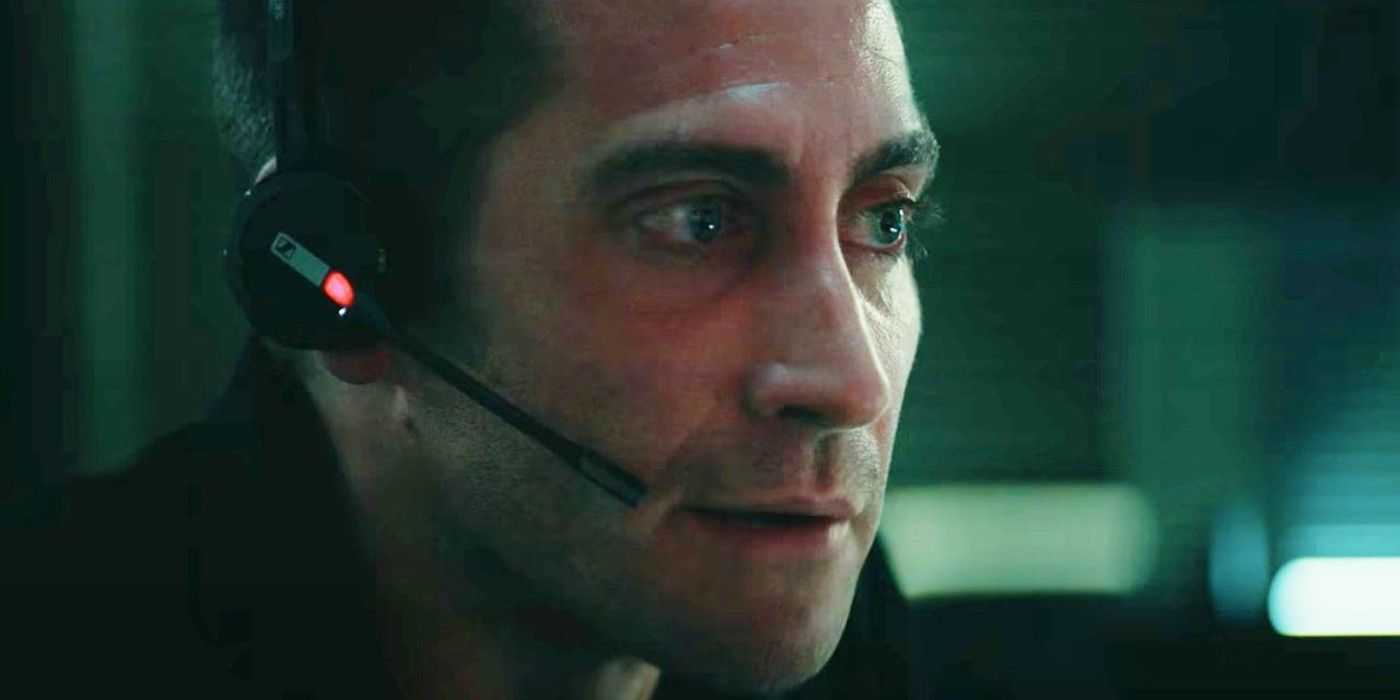Warning: Major SPOILERS for The Guilty
The Jake Gyllenhaal-starring thriller The Guilty features a surprising plot twist that sets up an emotional conclusion. Throughout the movie, Gyllenhaal's character Joe believes that he is helping a woman escape from her abusive ex-husband. However, the truth turns out to be different in a way that shakes Joe's confidence and causes a major change of heart.
The Guilty was filmed over just 11 days during the COVID-19 pandemic, and it is set entirely inside an emergency dispatch center. Gyllenhaal's Joe is a police officer working the phone lines after being suspended from patrol duty due to a shooting. He is curt and judgmental towards most of the callers, but he becomes invested in a caller named Emily, a woman who calls and suggests that she has been abducted. The Guilty has received positive reviews and is a remake of a Danish film of the same name. Veteran thriller director Antoine Fuqua helmed the film while in quarantine himself.
As the story continues, Joe moves to an isolated room so that he can go beyond the scope of his job in helping Emily. He sends friends to check on her children and calls her husband Henry herself to angrily accuse him. However, another call from Emily complicates and reverses how Joe thought of the situation and, in part, how he thinks of himself.
What Happens In The Guilty's Ending
Throughout the first half of The Guilty, lead character Joe believes that Henry is a threat to Emily and her children, based on Henry's criminal record and Emily's 911 call, voiced by Riley Keough. However, in a later conversation with Joe, Emily mentions "getting the snakes out" of her son Oliver, presumably referring to his internal organs. Joe realizes that Emily is mentally disturbed and is the one who is a threat to her children and herself. When Joe's friend Rick searches Henry's house, he discovers mail indicating that Henry was trying to help Emily get psychiatric help.
The Guilty sets up its twist throughout its first half. The movie relies on the viewer to have the same biases as Joe: the viewer believes the first person Joe talks to while seeing Henry's criminal record as confirmation of a threat. However, Henry never receives even a concrete accusation from Emily, who acts as if she is unable to talk freely. Like Joe, the audience is primed to make an assumption based on limited information, a psychological trick that could help The Guilty compare well with other twisty movies like Malignant.
Following the twist, the focus shifts towards Joe trying to save Emily from herself, including stopping her from committing suicide. While he initially believes he has failed, based on Emily saying she is "going to be with Oliver," the end of their call actually means that Emily is choosing life, as she believes her son is still alive. Joe is informed that both Emily and Oliver survived. However, he remains troubled by the experience -- as well as his own demons, which he confesses to by the story's ending.
What Crime Did Joe Commit?
Throughout The Guilty there are hints about the incident that landed Joe on desk duty. On his private phone, he converses with his police chief and Rick, trying to plan out a hearing that will take place the next day. Recent protests have forced movies and TV shows like Brooklyn Nine-Nine to reckon with the topic of police brutality, and it seems Joe is responsible for just such an incident. At the start of the movie, however, he is confident that practiced testimony from Rick and the involvement of his chief will get him back on the streets quickly.
The Guilty never fully breaks down what Joe did, but he describes it vaguely to Emily. Joe says that the man he killed was a 19-year-old named Joseph, because he was "angry" and wanted to "punish" Joseph for hurting someone else. It seems reasonable to assume that Joseph was someone that Joe encountered through his police work and that he shot him unnecessarily as a result of the same anger he displays throughout The Guilty.
As in previous movies like Nightcrawler and the Southpaw, Jake Gyllenhaal brings an angry intensity to the role of Joe. It is easy to see how this man could shoot someone in anger. As a police officer, Joe seems motivated less by the desire to help people and more by a desire to punish, as seen in his angry rant to Henry. Joe could likely escape punishment for the shooting with testimony that he was under direct threat, and Rick has already testified to such an exculpatory scenario. However, at the end of the movie he decides to plead guilty, which newscasters note is very rare for police.
Why Does Joe Plead Guilty?
Joe's decision to plead guilty is central to the entire film, as suggested by the title The Guilty. The movie echoes influential media like The Wire in depicting police as an insular culture that protects its own regardless of wrongdoing, meaning that flawed people like Joe can continue to be reckless and violent. Because of this, it is up to Joe himself to realize his shortcomings, and his actions during Emily's emergency call make his own flaws clear to himself.
Because he assumes that Henry is a "bad guy," Joe is willing to go beyond the rules of his job to punish him, including advising Emily to hit him with a brick. By trying to hurt Henry instead of figuring out the situation, Joe endangers Emily and Oliver. This is the same short-sighted anger that led to the death of Joseph. The harrowing experience of talking Emily down from the ledge forces Joe to confront his failures in the earlier case.
The Real Meaning Of The Guilty's Ending
The Guilty begins with the epigraph "The truth shall set you free," placing it alongside Pulp Fiction in using Bible verses to instill the film with a deeper -- possibly spiritual -- meaning. The movie's central suspense plotline and Joe's suggested backstory combine to both highlight the limitations of Joe's moralistic worldview and his quickness to anger, showing the real harm these qualities can cause. Ultimately, Joe takes responsibility for failing Emily, telling her that "I put you up on that overpass." Pleading guilty in his trial is a way of taking responsibility for the death of Joseph. The ending of The Guilty thus represents a cathartic moment of self-understanding for Joe, where he accepts the truth and is forced to confront and take responsibility for his failings in order to start making things right.

